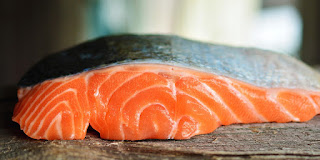The Ultimate Guide to Salmon: A Nutritional Powerhouse for Optimal Health
Salmon is often celebrated as one of the most nutritious foods on the planet. This fatty fish is not only packed with essential nutrients but also boasts a rich, satisfying taste that makes it a staple in many diets worldwide. From improving heart health to supporting brain function, the benefits of consuming salmon are well-documented by scientific research. In this article, we’ll explore the key reasons why salmon should be a part of your diet, dive into its remarkable nutritional profile, and offer practical ways to incorporate it into your meals.
Salmon’s Nutritional Profile: A Deep Dive
Salmon’s impressive nutrient content varies slightly depending on whether it’s wild-caught or farmed. However, both types provide an abundance of vital vitamins, minerals, and healthy fats.
Macronutrients Per 3.5-Ounce (100g) Serving
| Nutrient | Wild Salmon | Farmed Salmon |
|---|---|---|
| Calories | 182 | 206 |
| Protein | 25g | 22g |
| Total Fat | 8g | 12g |
| Omega-3 Fats | 2.2g | 2.3g |
Micronutrient Highlights
Vitamin B12: Supports nerve function and red blood cell production
Selenium: Aids in thyroid function and DNA synthesis
Potassium: Helps regulate blood pressure and fluid balance
Astaxanthin: A powerful antioxidant with anti-inflammatory properties
Top Health Benefits of Salmon
1. Rich in Omega-3 Fatty Acids for Heart and Brain Health
Omega-3 fatty acids, particularly EPA and DHA, are essential for reducing inflammation, lowering blood pressure, and supporting cardiovascular health. Unlike plant-based omega-3 sources like flaxseeds, salmon provides long-chain omega-3s that are readily absorbed by the body.
2. High-Quality Protein for Muscle Maintenance and Recovery
Each serving of salmon contains 22–25 grams of complete protein, making it an excellent choice for muscle recovery, satiety, and metabolic function. Protein is essential for tissue repair, immune support, and maintaining lean muscle mass, especially as we age.
3. Loaded with B Vitamins for Energy and Brain Function
Salmon is a powerhouse of B vitamins, including B12, B6, and niacin, which are crucial for converting food into energy and maintaining optimal brain function. These vitamins also play a role in reducing chronic inflammation, which is linked to various diseases.
4. A Natural Source of Potassium for Heart Health
Wild salmon contains more potassium per serving than a banana. This mineral is essential for managing blood pressure and reducing the risk of stroke by balancing sodium levels in the body.
5. Selenium for Thyroid Support and Immune Health
Selenium is a trace mineral found in high amounts in salmon. Studies suggest that adequate selenium intake helps prevent oxidative stress, supports thyroid function, and may lower the risk of certain cancers.
6. Astaxanthin: The Secret Antioxidant in Salmon
Astaxanthin, the carotenoid responsible for salmon’s pink hue, is a potent antioxidant that protects against oxidative stress and inflammation. It has been shown to reduce LDL (bad cholesterol) oxidation while increasing HDL (good cholesterol), promoting overall heart health.
Wild vs. Farmed Salmon: Which One is Better?
Both wild and farmed salmon provide incredible health benefits, but there are some key differences:
Wild Salmon: Lower in fat, slightly higher in protein, and naturally richer in minerals like potassium.
Farmed Salmon: Contains more omega-3 fatty acids but also tends to have a higher calorie and fat content.
For those seeking the most nutrient-dense option with fewer potential contaminants, wild-caught salmon is generally preferred. However, farmed salmon remains a good alternative for those looking for a more affordable and accessible option.
How to Incorporate More Salmon into Your Diet
Adding salmon to your diet can be both easy and delicious. Here are some simple ways to enjoy this nutritious fish:
Grilled Salmon: A quick and flavorful way to retain its natural richness.
Salmon Salad: Combine with leafy greens, avocado, and a lemon vinaigrette.
Baked Salmon: Infuse with garlic, herbs, and olive oil for a healthy meal.
Salmon Sushi Rolls: A high-protein snack or meal packed with omega-3s.
Salmon Burgers: A nutritious alternative to traditional beef patties.
Conclusion: The Ultimate Superfood for Longevity
Salmon is more than just a delicious fish—it’s a nutrient-dense powerhouse that can significantly enhance overall health. Whether you’re looking to improve heart function, boost brain health, or maintain a balanced diet, salmon is one of the best foods you can eat. With its wealth of vitamins, minerals, and omega-3s, incorporating salmon into your weekly meal plan is a simple yet powerful step toward optimal well-being.
For maximum health benefits, aim to consume at least two servings of salmon per week. Whether wild or farmed, this incredible fish remains one of nature’s best gifts to human health.



Comments
Post a Comment